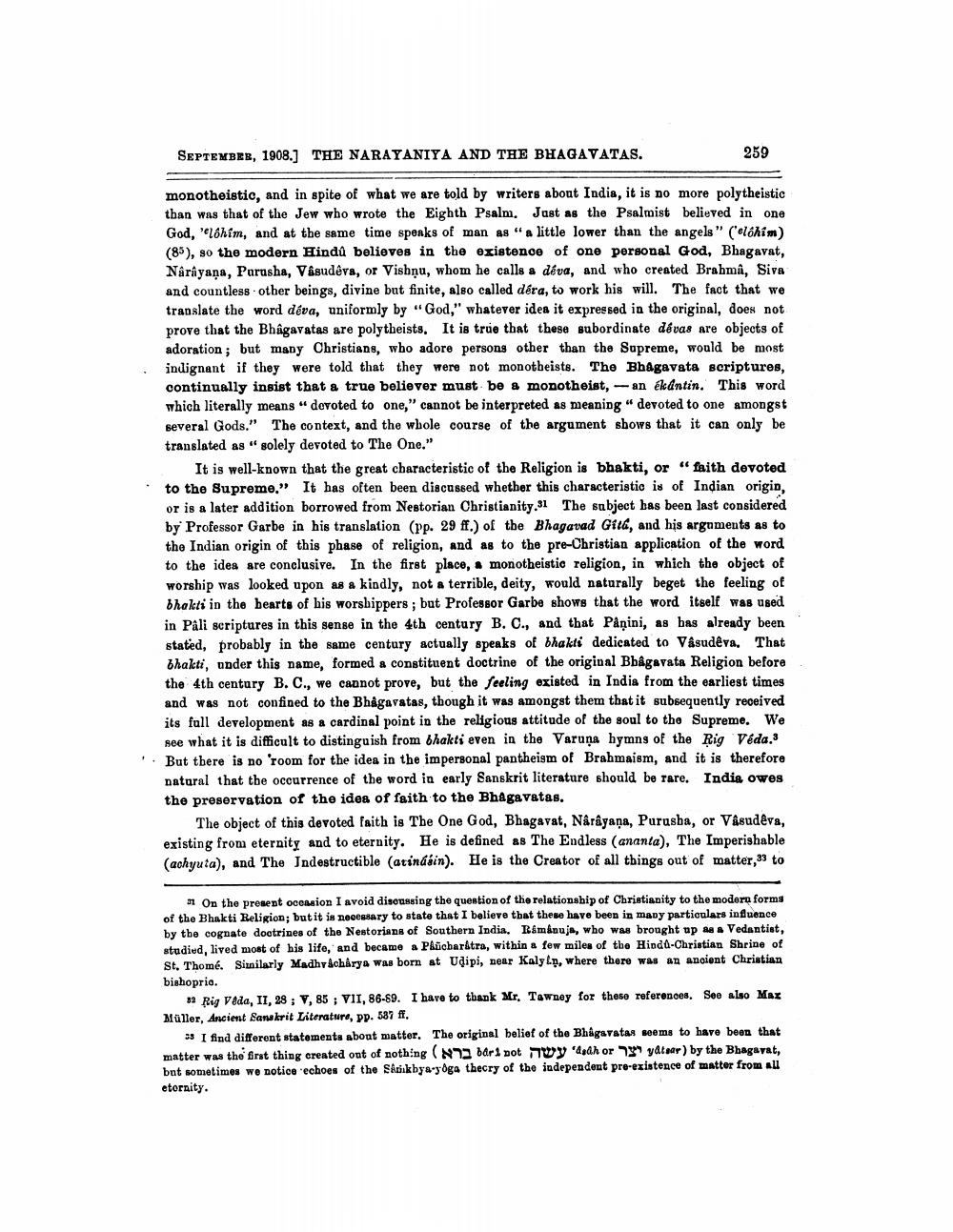________________
259
SEPTEMBER, 1908.] THE NARAYANIYA AND THE BHAGAVATAS.
monotheistic, and in spite of what we are told by writers about India, it is no more polytheistic than was that of the Jew who wrote the Eighth Psalm. Just as the Psalmist believed in one God, 'lohim, and at the same time speaks of man as "a little lower than the angels" (előhím) (85), so the modern Hindû believes in the existence of one personal God, Bhagavat, Narayana, Purusha, Vasudeva, or Vishnu, whom he calls a déva, and who created Brahmâ, Siva and countless other beings, divine but finite, also called déra, to work his will. The fact that we translate the word déva, uniformly by "God," whatever idea it expressed in the original, does not prove that the Bhagavatas are polytheists. It is true that these subordinate devas are objects of adoration; but many Christians, who adore persons other than the Supreme, would be most indignant if they were told that they were not monotheists. The Bhagavata scriptures, continually insist that a true believer must be a monotheist, an ékantin. This word which literally means "devoted to one," cannot be interpreted as meaning "devoted to one amongst several Gods." The context, and the whole course of the argument shows that it can only be translated as "solely devoted to The One."
It is well-known that the great characteristic of the Religion is bhakti, or "faith devoted to the Supreme." It has often been discussed whether this characteristic is of Indian origin, or is a later addition borrowed from Nestorian Christianity.31 The subject has been last considered by Professor Garbe in his translation (pp. 29 ff.) of the Bhagavad Gité, and his arguments as to the Indian origin of this phase of religion, and as to the pre-Christian application of the word to the idea are conclusive. In the first place, a monotheistic religion, in which the object of worship was looked upon as a kindly, not a terrible, deity, would naturally beget the feeling of bhakti in the hearts of his worshippers; but Professor Garbe shows that the word itself was used in Pâli scriptures in this sense in the 4th century B. C., and that Panini, as has already been stated, probably in the same century actually speaks of bhakti dedicated to Vâsudêva. That bhakti, under this name, formed a constituent doctrine of the original Bhagavata Religion before the 4th century B. C., we cannot prove, but the feeling existed in India from the earliest times and was not confined to the Bhagavatas, though it was amongst them that it subsequently received its full development as a cardinal point in the religious attitude of the soul to the Supreme. We see what it is difficult to distinguish from bhakti even in the Varuna hymns of the Rig Véda.3 But there is no 'room for the idea in the impersonal pantheism of Brahmaism, and it is therefore natural that the occurrence of the word in early Sanskrit literature should be rare. India owes the preservation of the idea of faith to the Bhagavatas.
The object of this devoted faith is The One God, Bhagavat, Nârâyana, Purusha, or Vasudeva, existing from eternity and to eternity. He is defined as The Endless (ananta), The Imperishable (achyuta), and The Indestructible (atinááin). He is the Creator of all things out of matter,33 to
On the present occasion I avoid discussing the question of the relationship of Christianity to the modern forms of the Bhakti Religion; but it is necessary to state that I believe that these have been in many particulars influence by the cognate doctrines of the Nestorians of Southern India. Râmânuja, who was brought up as a Vedantist, studied, lived most of his life, and became a Paucharitra, within a few miles of the Hindu-Christian Shrine of St. Thomé. Similarly Madhvacharya was born at Udipi, near Kaly in, where there was an ancient Christian bishopric.
32 Rig Veda, II, 28; V, 85; VII, 86-89. I have to thank Mr. Tawney for these references. See also Max Müller, Ancient Sanskrit Literature, pp. 587 ff.
s I find different statements about matter. The original belief of the Bhagavatas seems to have been that matter was the first thing created out of nothing ( bari not dadh or yataar) by the Bhagavat, but sometimes we notice echoes of the Samikbya-yoga thecry of the independent pre-existence of matter from all eternity.




